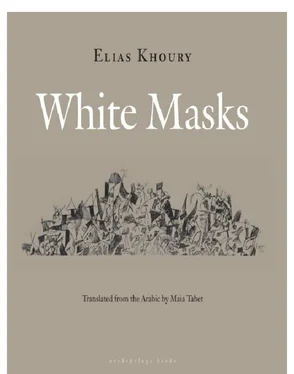Her cousin told her that’s what you get for marrying Mahmud Fakhro without consulting anyone! But who was she to consult? Her father had stopped coming, most likely he’d passed away. Her cousin told her that he had died working in the fields and that her brothers had gone to Istanbul to find work. Her mother was long since dead — before she even came to work for Mr. Mitri Helou in Beirut and her father’s marriage to that wild-haired shrew! She didn’t know anyone to consult.
Mahmud had apparently approached Mr. Mitri, and it was he who told her. The lady of the house came into the kitchen one day and told her that Mr. Mitri wanted to see her in the living room.
She dried her hands, smoothed back her long, flowing hair, and went out to the living room. She remained standing, but Mr. Mitri asked her to sit down in the armchair across from him. Fatimah was surprised: the khawaja, or master, had never asked her to sit, nor spoken to her in such a friendly way before.
“Fatimah, my dear, you’re like my own daughter,” he began. Then he cleared his throat and looked her straight in the eyes. Fatimah averted her gaze. “And. . you know. . well. . such is the way of the world. . you know Mahmud, the new caretaker of the building, Mahmud Fakhro. Well, he’s come and asked me for your hand in marriage. He’s a good boy, I’ve made inquiries about him — he’s a Kurd, like you, and he wants to settle down. You’ll remain close by, you know you’re like a daughter to us, you’ll live with him in the ground-floor quarters. . and you’ll go on working here, nothing will change. Mind you, I didn’t make any promises. I said I’d ask you first. So, what do you think?”
Fatimah said nothing. The thing was, that whenever she thought of marriage, she imagined someone like Fadee — tall and fair and soft-spoken, with shy, doe-like eyes. . But Mahmud. . well. . she didn’t like him. . no, it’s not that she didn’t like him, but he wasn’t at all like Fadee. . He was short and stocky and half-bald, and she could see the thick black hairs on his legs when he rolled up his trousers to wash the stairs. . and the way he looked at her and intoned those mashallahs whenever she went by! She didn’t feel the blood rushing to her ears when she saw him, the way she did when she thought of Fadee.
Fatimah said nothing. Then she burst into tears.
“Listen to me, girl: you’re an orphan and this is for the best. You’re not a child anymore, you’re sixteen, a young woman already. . And you’ll remain right here with us.” Fatimah was crying, and Mr. Mitri got up and patted the shoulder of the weeping Fatimah to comfort her.
After that, everything happened very quickly. Mahmud’s sister came over and said Fatimah had to wear this white headwrap from now on. Then they took her to his brother’s house, which was full of people she didn’t know, and Mahmud sat next to her in the middle of the room. There was music, and everybody drank juice and ate sweets. Then everyone left and Fatimah returned to the building with him. When they entered the caretaker’s quarters, Fatimah stood expectantly as Mahmud closed the door behind them.
“Take off your clothes,” he ordered, and he turned out the lights and started to undress. Fatimah felt so scared her joints ached. He came up to her, clapped his hand over her mouth and started hitting her. Then he started circling around her, bobbing up and down on his feet and striking her. She tried to scream but his hand was still clamped over her mouth. She was ready to get down on her knees and kiss his hands, why was he hitting her so hard, and with that stick? Then he threw her to the ground, and began ripping off her clothes… she wanted to tell him not to tear them. . she would undress by herself, she knew what a man and a woman did when they were married! But he just tore them off, raised her up toward him and, grunting and moaning, pushed in his thing. Despite the searing pain she felt, she didn’t utter a cry — how could she, anyway, with his hand over her mouth — but she wanted to tell him to let go, so she could breathe. But he didn’t. And that thing, oh God, the pain, the unbearable pain, it hurt so much. . then slowly, gradually, his hand let go of her mouth, and he started stroking her, first her body, then her face. And the pain changed. . she began to feel something similar to when Fadee held her hand once. . except that it burst. The feeling she’d had then was bursting in her now. . and Mahmud seemed to be spinning around, it felt like everything was spinning around her. She closed her eyes at this sensation she had never experienced before, and when she opened them again she could make out his darkened face in the shadows. At that moment, she wanted to glue herself to him, to keep the thing inside her throbbing — she really wanted him now — but he pulled out.
Sitting up in bed beside her, he lit a cigarette and started to hum. Now she felt embarrassed, so she got up and asked him to get off the sheet. But when she tried to take a step, the soreness spread all the way down to her feet. Still, she took the sheet into the bathroom and came back to the bare bed.
He was still humming. . But then he threw his cigarette to the floor, gathered her into his arms and started over again. This time she didn’t feel any pain: it was different, he was different. This man, Mahmud, was tender now, kissing her face and neck. . she wanted to kiss him back, but she felt shy. . afraid somehow. . and so she lay in his arms, lips closed and teeth clenched. . And when he climbed off her for the second time, he didn’t light a cigarette, he just rolled over and went to sleep.
And that is how she became Mahmud’s wife, and her name became Fatimah Fakhro. And even though he was no different than before the wedding, now she found him attractive — she wanted him to come to her in bed, and longed for the darkness to fall.
Why then did she begin to dread the nights and loathe the man when he climbed off her? Why did the pain return — she didn’t dare tell anyone about it — and her belly start to swell? Children, that’s why. Sitt Huda always said: “Why do you people have so many children?” And Fatimah wouldn’t know what to say. Sitt Huda had only two children, Fadee and Marie, who was studying in Paris, but she, Fatimah, had five of them, and she was pregnant again.
Mahmud would sit outside the entrance of the building all day, while she cooked both upstairs and downstairs. He just sat there, chatting to the shopkeepers, doing nothing — even washing the stairs was her job now, and she didn’t dare ask for his help. He only ever took care of her during her confinements. He spent all his time with little Ali — of course, Fatimah loved Ali, she loved all her children — but all Mahmud ever did was sit there playing with Ali in front of the building. All day. Every day.
And Fadee had stopped casting those sideways glances at her, maybe because she’d aged. “I look older than Sitt Huda,” she’d say to Mahmud. But he’d ignore her and keep humming. He’d say the lady wasn’t a real woman, anyway.
“Real women bear children. . But this Sitt Huda, she does nothing all day, while her poor husband toils away.”
Fadee wouldn’t even glance at her when he came into the kitchen. Perhaps it was because he was older now, but he was still fair-skinned and had those doe-like eyes of his that rekindled in her the memory of that strange sensation. .
She’d been sitting on the bed in her small room darning socks, and Fadee — who was the same age as her, as Sitt Huda liked to point out — had come in one day. He entered her little room just off the kitchen and asked her to make him a cup of coffee. She got to her feet.
“But you never drink coffee.”
“I do now,” he replied, as he puffed on an American cigarette.
Читать дальше












